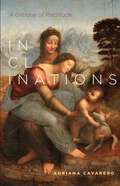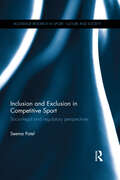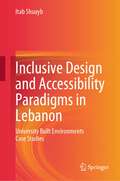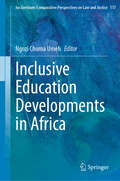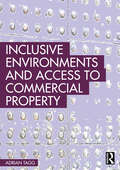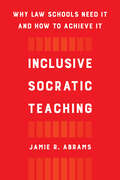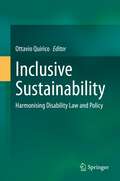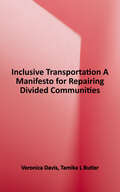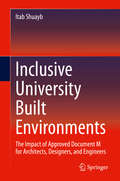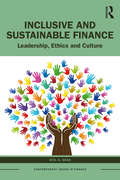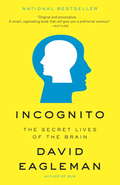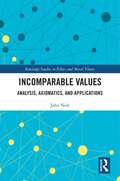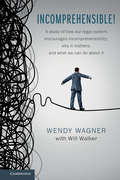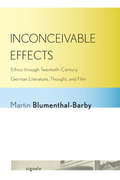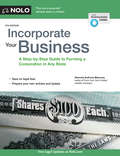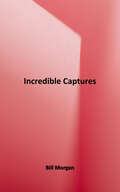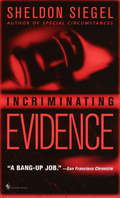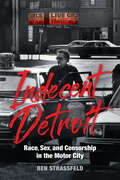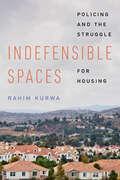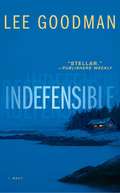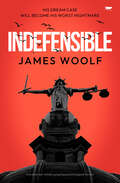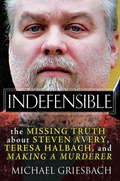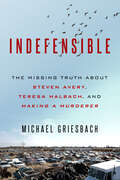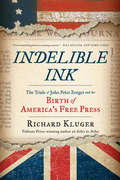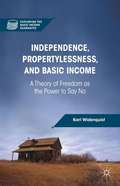- Table View
- List View
Inclinations: A Critique of Rectitude
by Adriana Cavarero Adam Sitze Amanda MinerviniIn this new and accessible book, Italy's best known feminist philosopher examines the moral and political significance of vertical posture in order to rethink subjectivity in terms of inclination. Contesting the classical figure of homo erectus or "upright man," Adriana Cavarero proposes an altruistic, open model of the subject--one who is inclined toward others. Contrasting the masculine upright with the feminine inclined, she references philosophical texts (by Plato, Thoman Hobbes, Immanuel Kant, Hannah Arendt, Elias Canetti, and others) as well as works of art (Barnett Newman, Leonardo da Vinci, Artemisia Gentileschi, and Alexander Rodchenko) and literature (Marcel Proust and Virginia Woolf).
Inclusion and Exclusion in Competitive Sport: Socio-Legal and Regulatory Perspectives (Routledge Research in Sport, Culture and Society)
by Seema PatelSociety is obsessed with categorising and treating individuals and groups according to their physical and non-physical differences, such as sex, gender, disability and race. This treatment can lead to the inclusion or exclusion of an individual from the tangible and intangible benefits of society. Where this practice becomes discriminatory, legal frameworks can protect human rights and ensure that people are treated with due respect for their similarities and differences. In a sporting context, the inclusion and exclusion of athletes based upon their differences is often a necessary part of the essence of competitive sporting activity, arranged around rules and categories that can have an unequal exclusionary impact on certain classes of individual. Dominant sporting cultures can also have exclusionary effects. This important and innovative book seeks to investigate the socio-legal and regulatory balance between inclusion and exclusion in competitive sport. It critically analyses a range of legal and non-legal cases concerning sport-specific inclusion and exclusion in the areas of sex, gender, disability and race, including those cases involving Oscar Pistorius, Caster Semenya and Luis Suarez, to identify the extent to which the law and sport adopt a justifiable and legitimate inclusive or exclusive approach to participation. The book explores national and international regulatory frameworks, identifying deficiencies and good practice, and concludes with recommendations for regulatory reform. Inclusion and Exclusion in Competitive Sport is important reading for anybody with an interest in the relationship between sport and wider society, sports development, sport management, sports law, or socio-legal studies.
Inclusive Design and Accessibility Paradigms in Lebanon: University Built Environments Case Studies
by Itab ShuaybThis book describes the disability rights movement that started in the USA and its influence on the disability rights movement in Lebanon, which has led to the endorsement of the Lebanese Disability Act 220/2000. The book introduces the reader to the Lebanese Disability Act 220/ 2000, its definition of disability, and its relation to the medical and social models of disabilities and then articulate the Act articles. Then, it defines the inclusive design paradigm that acknowledges the needs of all people at each stage of their life cycle and presents the difference between inclusive design and accessibility and disability notions. Moreover, the book reviews the different international accessible design standards (American and French) that are adopted in Lebanon with the absence of a nationalized Lebanese design standard and its effect on eliminating barriers and enhancing accessibility at university buildings. Besides, the book presents students' experiences and their satisfaction with the university built environments. 6 university buildings case studies at the American University of Beirut are assessed and analysed to check whether they adopt the inclusive design approach and then propose inclusive design solutions for both heritage and modern university buildings. What makes the book unique is its combination of empirical and theoretical application of inclusive design. The last section, reflects the author’s inclusive design teaching pedagogy. In this section, the author shares samples of students’ class design project and provides recommendations and guidelines for teaching inclusive design so it becomes mainstream.
Inclusive Education Developments in Africa (Ius Gentium: Comparative Perspectives on Law and Justice #117)
by Ngozi Chuma UmehThis book contributes to the discourse on disability in Africa as an issue of systemic exclusion characterized by the discrimination and often complete segregation of persons with disabilities (PWDs) in various African countries. Despite the inclusive promise of the Convention on the Rights of Persons with Disabilities (CRPD) as well as the Protocol to the African Charter on Human and Peoples’ Rights on the Rights of Persons with Disabilities in Africa, the situation has not actually improved for PWDs in Africa. Given the powerful evidence of the devaluation of PWDs in connection with the COVID-19 pandemic, it is high time to reflect on the experiences of persons with disabilities in education, along with other forms of discrimination they encounter. The book’s respective chapters assess how well the existing legal frameworks, policies and practices in most African countries have met the needs for inclusion of children and adults with disabilities. The social and economic rights of persons with disabilities are protected in the constitutions of most countries and enshrined in the normative frameworks that most African leaders have adopted and ratified. These commitments need to be borne in mind when thinking about the present and the future. Inclusive development is an investment and must be viewed as part of a package of reforms that are connected to substantive social protection and improvements in realizing other socio-economic goods. Indeed, a range of alliances are needed to advance the goals of ‘leaving no one behind’, ensuring ‘education for all’, and delivering on the African Union’s call for the development of policies, programmes and requisite budgets for the realization of inclusive education for persons with disabilities.
Inclusive Environments and Access to Commercial Property
by Adrian TaggThis book presents and examines the challenges and compromises required to deliver inclusivity in the existing commercial-built environment and the socio-economic benefits that could result from successfully delivering it.To illuminate the advantages of an inclusive environment to property owners, investors and service providers, the book covers the history of disability and evolution of the legislation and examines the demographics and types of disability to question the ‘one size’ ‘blanket’ approach that currently exists to providing access. Delving further into the characteristics of the commercial property sectors and individual disability-specific requirements, experienced commercial building surveyor, Adrian Tagg, analyses the contradictions in the existing legislation to establish examples of design compromise or reasonable adjustments. He seeks to contextualise public and commercial attitudes to disability and go further to demystify the term ‘reasonable adjustment’, which is used currently as a tool of compromise in providing access. The aim is to assess disability-specific requirements for access, as well as adopt a simplistic approach to developing access solutions to the existing built environment from a consultancy and user perspective.Ultimately, this publication hopes to promote accessibility and inclusion from the perspective of surveyors, investors and landlords working in commercial property. It is not just targeted at those on undergraduate or post-graduate surveying courses, as well as those early career professionals undertaking their APC or post-graduate qualifications, but also at those owning or delivering goods, services and employment from commercial premises who want to make a difference.
Inclusive Socratic Teaching: Why Law Schools Need It and How to Achieve It
by Jamie R. AbramsFor more than fifty years, scholars have documented and critiqued the marginalizing effects of the Socratic teaching techniques that dominate law school classrooms. In spite of this, law school budgets, staffing models, and course requirements still center Socratic classrooms as the curricular core of legal education. In this clear-eyed book, law professor Jamie R. Abrams catalogs both the harms of the Socratic method and the deteriorating well-being of modern law students and lawyers, concluding that there is nothing to lose and so much to gain by reimagining Socratic teaching. Recognizing that these traditional classrooms are still necessary sites to fortify and catalyze other innovations and values in legal education, Inclusive Socratic Teaching provides concrete tips and strategies to dismantle the autocratic power and inequality that so often characterize these classrooms. A galvanizing call to action, this hands-on guide equips educators and administrators with an inclusive teaching model that reframes the Socratic classroom around teaching techniques that are student centered, skills centered, client centered, and community centered.
Inclusive Sustainability: Harmonising Disability Law and Policy
by Ottavio QuiricoIn light of the third-generation concept of ‘inclusive sustainability’, the volume explores the architecture of global disability governance and its degree of harmonisation. The book integrates socio-cultural, economic, political and legal analyses from an international and comparative perspective. The first part of the volume outlines a tripartite systematisation of disability rights for States and non-state persons. In light of essential economic considerations, the second part explores the relationship between disability and specific fundamental rights and regimes, particularly the rights to life, health, education, work and participation. The third part takes an institutional approach and focuses on the way in which the UN and regional organisations regulate disability (rectius, different ability).
Inclusive Transportation: A Manifesto for Repairing Divided Communities
by Veronica DavisTransportation planners, engineers, and policymakers in the US face the monumental task of righting the wrongs of their predecessors while charting the course for the next generation. This task requires empathy while pushing against forces in the industry that are resistant to change. How do you change a system that was never designed to be equitable? How do you change a system that continues to divide communities and cede to the automobile? In Inclusive Transportation: A Manifesto for Repairing Divided Communities, transportation expert Veronica O. Davis shines a light on the inequitable and often destructive practice of transportation planning and engineering. She calls for new thinking and more diverse leadership to create transportation networks that connect people to jobs, education, opportunities, and to each other. Inclusive Transportation is a vision for change and a new era of transportation planning. Davis explains why centering people in transportation decisions requires a great shift in how transportation planners and engineers are trained, how they communicate, the kind of data they collect, and how they work as professional teams. She examines what “equity” means for a transportation project, which is central to changing how we approach and solve problems to create something safer, better, and more useful for all people. Davis aims to disrupt the status quo of the transportation industry. She urges transportation professionals to reflect on past injustices and elevate current practices to do the hard work that results in more than an idea and a catchphrase. Inclusive Transportation is a call to action and a practical approach to reconnecting and shaping communities based on principles of justice and equity.
Inclusive University Built Environments: The Impact of Approved Document M for Architects, Designers, and Engineers
by Itab ShuaybThis book investigates the impact of Approved Document M—introduced to address accessibility and usability issues for people with disabilities in newly constructed facilities—on different university buildings in the United Kingdom. A selection of six buildings at the University of Kent, the University of Bath, and the University of Essex, built within the six decades spanning the 1960s through the 2010s, are studied to investigate the impact of the measure on changing building designs to be accessible for all potential users, including people with disabilities. The book dissects specifically the University of Kent case study, delineating benefits of the inclusive design approach. Providing case studies of existing educational buildings and recommendations case studies of existing educational buildings and provides recommendations, the book is ideal for engineers, architects, built environment researcher, designers and standard committees.
Inclusive and Sustainable Finance: Leadership, Ethics and Culture (Contemporary Issues in Finance)
by Atul K. ShahInstead of being a means to an end, finance has become an end in itself and a master of economic actions and priorities. The role of ethics, culture and faith has been diminished by neoliberalism over the last forty years, such that we are living through a profound moral crisis, rising inequality and plutocracy. This practice is destroying the social and trust capital that already exists and is in need of replenishing. This pioneering book draws upon diverse wisdom traditions and their current living business practices to show that not only is another world possible, but it is actually hiding in plain sight. The author argues that our obsession with technocratic economic science has disabled us from exposing the organic and culturally diverse practices of finance. The climate and inequality crises demand new institutional and cultural solutions to transform behaviour and heal the planet. Through real-life examples and case studies, this book illustrates and develops a new organic theory of finance which can be taught and shared all over the world, helping society to prepare for a sustainable and inclusive future. It provides valuable empowerment to experts and professionals from different cultures and traditions to write about their own finance practices and in turn encourage their students and communities to embrace sustainability ideals. There is a global audience for this book, given its multicultural outlook and the diversity of narratives and case studies, from entrepreneurs to MBA students and leaders in accounting and finance. It also has huge relevance for policymakers and educators keen on embracing sustainable finance in their curriculum.
Incognito: The Secret Lives of the Brain
by David EaglemanIf the conscious mind--the part you consider to be you--is just the tip of the iceberg, what is the rest doing? In this sparkling and provocative new book, the renowned neuroscientist David Eagleman navigates the depths of the subconscious brain to illuminate surprising mysteries: Why can your foot move halfway to the brake pedal before you become consciously aware of danger ahead? Why do you hear your name being mentioned in a conversation that you didn't think you were listening to? What do Ulysses and the credit crunch have in common? Why did Thomas Edison electrocute an elephant in 1916? Why are people whose names begin with J more likely to marry other people whose names begin with J? Why is it so difficult to keep a secret? And how is it possible to get angry at yourself--who, exactly, is mad at whom? Taking in brain damage, plane spotting, dating, drugs, beauty, infidelity, synesthesia, criminal law, artificial intelligence, and visual illusions, Incognito is a thrilling subsurface exploration of the mind and all its contradictions.
Incomparable Values: Analysis, Axiomatics and Applications (Routledge Studies in Ethics and Moral Theory)
by John NoltPeople tend to rank values of all kinds linearly from good to bad, but there is little reason to think that this is reasonable or correct. This book argues, to the contrary, that values are often partially ordered and hence frequently incomparable. Proceeding logically from a small set of axioms, John Nolt examines the great variety of partially ordered value structures, exposing fallacies that arise from overlooking them. He reveals various ways in which incomparability is obscured: using linear indices to summarize partially ordered data, relying on an inadequately defined concept of parity, or conflating incomparability with vagueness. Incomparability can enrich and clarify a range of topics including the paradoxes of Derek Parfit, rational decision theory, and the infinite values of theology. Finally, Nolt shows how to generalize many of the concepts introduced earlier, explores the intricate depths of certain noteworthy partially ordered value structures, and argues for the finitude of value. Incomparable Values will be of interest to scholars and advanced students working in ethics, value theory, rational decision theory, and logic.
Incomprehensible!: A Study of How our Legal System Encourages Incomprehensibility, Why It Matters, and What We Can Do About It
by Wendy WagnerThe legal system is awash with excessive and incomprehensible information. Yet many of us assume that the unrelenting torrent of information pouring into various legal programs is both inevitable and unstoppable. We have become complacent; but it does not have to be this way. Incomprehensible! argues that surrendering to incomprehensibility is a bad mistake. Drawing together evidence from diverse fields such as consumer protection, financial regulation, patents, chemical control, and administrative and legislative processes, this book identifies a number of important legal programs that are built on the foundational assumption that 'more information is better'. Each of these legal processes have been designed in ways that ignore the imperative of meaningful communication. To rectify this systemic problem, the law must be re-designed to pay careful attention to the problem of incomprehensibility.
Inconceivable Effects
by Martin Blumenthal-BarbyIn Inconceivable Effects, Martin Blumenthal-Barby reads theoretical, literary and cinematic works that appear noteworthy for the ethical questions they raise. Via critical analysis of writers and filmmakers whose projects have changed our ways of viewing the modern world-including Hannah Arendt, Franz Kafka, Walter Benjamin, the directors of Germany in Autumn, and Heiner Mueller-these essays furnish a cultural base for contemporary discussions of totalitarian domination, lying and politics, the relation between law and body, the relation between law and justice, the question of violence, and our ways of conceptualizing "the human." A consideration of ethics is central to the book, but ethics in a general, philosophical sense is not the primary subject here; instead, Blumenthal-Barby suggests that whatever understanding of the ethical one has is always contingent upon a particular mode of presentation (Darstellung), on particular aesthetic qualities and features of media. Whatever there is to be said about ethics, it is always bound to certain forms of saying, certain ways of telling, certain modes of narration. That modes of presentation differ across genres and media goes without saying; that such differences are intimately linked with the question of the ethical emerges with heightened urgency in this book.
Incorporate Your Business: A Step-by-Step Guide to Forming a Corporation in Any State
by Anthony MancusoForm a corporation in any state, quickly and easily. Forming a corporation has many advantages, including limiting your personal liability. With the step-by-step instructions in this book, the process is straightforward and easy to accomplish. Incorporate Your Business clearly explains how to form a corporation in any state. It includes all the sample forms and information you need to prepare articles of incorporation and bylaws. It also fully discusses the advantages and tax consequences of incorporating your business, including: Limited liability Business owners limit their personal liability by incorporating, because they aren’t responsible for business debts and court judgments. Tax advantages Especially for smaller businesses, the ability to split income between yourself and your corporation can significantly lower your overall tax burden. Employee perks Owners of a corporation who also work for it can take advantage of significant financial benefits like equity plans, stock options, corporation-paid insurance, and more. Incorporate Your Business provides the forms you need, including articles of incorporation, bylaws, minutes, stock certificates and resolutions. This new edition is revised and updated to cover all changes in state, federal, and tax law.
Incredible Captures
by Bill MorganHere is all the excitement, action, and riveting detective work of five famous "foolproof" crimes being cracked--without the sensationalism and violence of adult true-crime books. Cases include the Brinks armored truck job, the largest hotel robbery in America's history, the dramatic rescue of a kidnapped little girl, and more.
Incriminating Evidence
by Sheldon SiegelWith his terrific first novel,Special Circumstances, Sheldon Siegel delivered legal fiction so exciting, it drew comparisons with the very top tier of courtroom thrillers. Now he has a new challenge for defense attorney Mike Daley--ex-priest, ex-husband, ex-public defender--and it's a high-profile zinger: a case he doesn't think he can win for a client he can't stand. It starts with a phone call Mike Daley never expected to get, from District Attorney Prentice Marshall Gates III, San Francisco's chief law enforcement officer and front-runner candidate for California attorney general. Friends they're not, but Gates needs Daley now--badly. He's just been arrested. A couple of hours earlier he woke up in his hotel room and found the dead body of a young male prostitute in the bed. Prosecutors are already talking the death penalty, and there's nothing in the mounting evidence to convince Daley and his partner--and ex-wife--Rosie of Gates's innocence. But even if he's lying, it's their job to defend him. Sure enough, the deeper Mike and Rosie dig, the seamier their findings. From a shady Internet entrepreneur who trades flesh for cash to a prominent businessman who uses muscle to keep his enterprise prospering, Mike and Rosie chase down leads that take them from the depths of the Mission District, where drugs and bodies are always for sale, to the gated mansions of Pacific Heights, frantically trying to piece together the shocking truth of what actually happened, even as the trial itself is under way.
Indecent Detroit: Race, Sex, and Censorship in the Motor City
by Ben StrassfeldWhile Detroit has been a major focus in urban history, little has been written on censorship in the very city that—due to shifting legalities, the urban crisis, and racial tensions—profoundly shaped media suppression in the United States. By examining censorship in film and literature, Indecent Detroit recounts the evolution of media control from the end of WWII through the 1970s, when the US saw a major change in the legal mechanisms used to censor media due to court rulings that curtailed censorship laws. Ben Strassfeld reveals how Detroit altered its censorial tactics and rhetoric from an obscenity-based system of censorship centered in the Detroit Police Department to a regulatory model based in zoning law that was then expanded nationwide. This shift was connected to broader social and political trends, including the sexual revolution, that led the public to increasingly turn against censorship. A must-read for film and media scholars, Indecent Detroit highlights how one Midwest city's ordinance was imitated across the country after it was upheld by the US Supreme Court, making this more than a local curiosity but also an influential model for the cultural, political, and moral control of urban space through media regulation.
Indefensible Spaces: Policing and the Struggle for Housing
by Rahim KurwaA free ebook version of this title is available through Luminos, University of California Press’s Open Access publishing program. Visit www.luminosoa.org to learn more.Indefensible Spaces examines the policing of housing through the story of Black community building in the Antelope Valley, Los Angeles County's northernmost outpost. Tracing its evolution from a segregated postwar suburb to a destination for those priced, policed, and evicted out of Los Angeles, Rahim Kurwa tells the story of how the Antelope Valley resisted Black migration through the policing of subsidized housing—and how Black tenants and organizers fought back. This book sheds light on how the nation's policing and housing crises intersect, offering powerful lessons for achieving housing justice across the country.
Indefensible: A Novel
by Lee GoodmanIn the bestselling tradition of Defending Jacob, this taut legal thriller follows the trail of a man determined to protect his community--and his family--at any cost.Sometimes a simple walk in the woods can lead you down the deadliest of trails... When birdwatcher Cassandra Randall stumbles upon two men digging what appears to be a grave in a state park, she immediately reports it to the authorities. Federal prosecutor Nick Davis is initially incredulous about her claims, but he agrees to investigate. To his surprise, the far-fetched account turns up a body, and Nick is drawn into a case that will shake both his morals and his personal life to their very core. One body quickly leads to another. The danger Cassandra has uncovered is just the beginning of a game of deadly stakes that implicates small-time drug dealers, petty thieves turned murderers, domestic abuse perpetrators, child pornographers, the highest offices of the legal system...and a criminal who is closer to Davis than he can even imagine.
Indefensible: A brand new totally gripping psychological thriller
by James WoolfA lawyer gets uncomfortably close to a former client, crossing a dangerous line, in this edgy debut thriller. Daniel, a criminal barrister, is working all hours on a sensational trial at the Old Bailey, defending a client he believes is wrongfully accused of a grisly murder. Determined to keep Rod out of prison, he begins to neglect his wife—and soon afterwards suspects she&’s having an affair. After Daniel triumphs in court, the bond he&’s formed with his newly acquitted client grows even stronger. Then Rod offers Daniel a favour that he really shouldn&’t accept . . . When things take a catastrophic turn, Daniel realises his conduct has veered from unprofessional to indefensible—and that he&’s trapped in a nightmare of his own making . . .
Indefensible: The Missing Truth about Steven Avery, Teresa Halbach, and Making a Murderer
by Michael GriesbachAn insider exposes the shocking facts deliberately left out of the hit Netflix series Making a Murderer--and argues persuasively that Steven Avery was rightfully convicted in the 2005 killing of Teresa Halbach. After serving eighteen years for a crime he didn't commit, Steven Avery was freed--and filed a thirty-six-million-dollar lawsuit against Manitowoc County, Wisconsin. But before the suit could be settled, Avery was arrested again--this time for the brutal murder of Teresa Halbach--and, through the office of a special prosecutor, convicted once more. When the saga exploded onto the public consciousness with the airing of Making a Murderer, Michael Griesbach, a prosecutor and member of Wisconsin's Innocence Project who had been instrumental in Avery's 2003 exoneration, was targeted on social media, threatened--and plagued by doubt. Now, in this suspenseful, thorough narrative, he recounts his own re-examination of the evidence in light of the whirlwind of controversy stirred up by the blockbuster true-crime series. As Griesbach carefully reviews allegations of tampering and planted evidence, the confession by Avery's developmentally disabled nephew, Brendan Dassey, and statements by Avery's former girlfriend Jodi Stachowski, previously sealed documents deemed inadmissible at trial by Judge Patrick L. Willis--and a little-known, plausible alternate suspect--Griesbach shows how the filmmakers' agenda, the accused man's dramatic backstory, and sensational media coverage have clouded the truth about Steven Avery. Now as Avery's defense counsel files an appeal and prepares to do battle in the courtroom once more, Griesbach fights to set the record straight, determined that evidence should be followed where it leads and justice should be served--for as surely as our legal system should not send an innocent man to prison, neither should it let a guilty man walk free. Includes 16 pages of photos
Indefensible: The Missing Truth about Steven Avery, Teresa Halbach, and Making a Murderer
by Michael GriesbachAn insider exposes the shocking facts left out of the hit Netflix series Making a Murderer—proving that Avery was guilty of murder—in this true crime book.After serving eighteen years for a crime he didn't commit, Steven Avery was freed—and filed a multi-million-dollar lawsuit against Manitowoc County, Wisconsin. But before the suit could be settled, Avery was arrested again—this time for the murder of Teresa Halbach. In that now-famous trial, he was convicted once more.When Making a Murderer became a runaway hit, prosecutor Michael Griesbach was targeted on social media—and plagued by doubt. Now he re-examines all the evidence, offering the most complete account of the case available. Griesbach reviews allegations of tampering and planted evidence, the confession by Avery's nephew, and statements by his former girlfriend. He also examines previously sealed documents deemed inadmissible at the trial—as well as a plausible alternate suspect.Through it all, Griesbach shows how the filmmakers' agenda, the accused man's dramatic backstory, and sensational media coverage have clouded the truth about Steven Avery.Includes sixteen pages of photos
Indelible Ink: The Trials of John Peter Zenger and the Birth of America
by Richard KlugerThe untold story of the battle to legalize free expression in America by the Pulitzer Prize-winning author of Ashes to Ashes. The liberty of written and spoken expression has been fixed in the firmament of our social values since our nation's beginning--the government of the United States was the first to legalize free speech and a free press as fundamental rights. But when the British began colonizing the New World, strict censorship was the iron rule of the realm; any words, true or false, that were thought to disparage the government were judged a criminally subversive--and duly punishable--threat to law and order. Even after Parliament lifted press censorship late in the seventeenth century, printers published what they wished at their peril. So when in 1733 a small newspaper, the New-York Weekly Journal, printed scathing articles assailing the new British governor, William Cosby, as corrupt and abusive, colonial New York was scandalized. The paper's publisher, an impoverished printer named John Peter Zenger with a wife and six children, in fact had no hand in the paper's vitriolic editorial content--he was only a front man for Cosby's adversaries, New York Supreme Court Chief Justice Lewis Morris and the shrewd attorney James Alexander. Zenger nevertheless became the endeavor's courageous fall guy when Cosby brought the full force of his high office down upon it. Jailed for the better part of a year, Zenger faced a jury on August 4, 1735, in a proceeding matched in importance during the colonial period only by the Salem Witch Trials. In Indelible Ink, acclaimed social historian Richard Kluger re-creates in rich detail this dramatic clash of powerful antagonists that marked the beginning of press freedom in America and its role in vanquishing colonial tyranny. Here is an enduring lesson that resounds to this day on the vital importance of free public expression as the underpinning of democracy.
Independence, Propertylessness, And Basic Income
by Karl WiderquistIndependence, Propertylessness, and Basic Income argues that philosophers have focused too much on scalar freedom and proposes a theory of status freedom as effective control self-ownership: the power to have or refuse active cooperation with other willing people, or simply: freedom as the power to say no.
